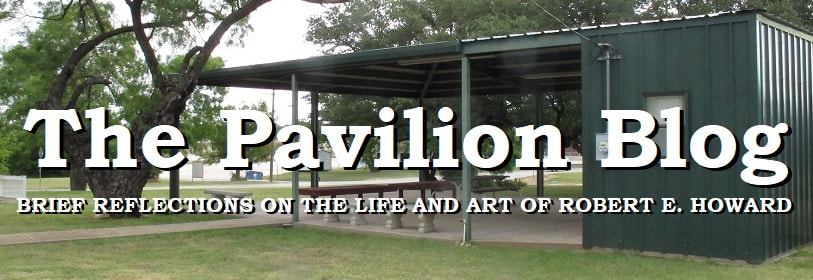|
By Gary Romeo
Robert E. Howard's racism is brought up from time to time. When The Hour of the Dragon was reprinted for the second time as Conan the Conqueror alongside Leigh Brackett's The Sword of Rhiannon in 1953 as an Ace Double, there was a significant edit. The first reprinting was in the Gnome Press hardcover in 1950 and, while also titled Conan the Conqueror, was not edited. Donald Wollheim changed a word at the end of Chapter 4. In the original tale as printed in Weird Tales, December 1935, Conan had just killed a black man who had imprisoned him, while another black guardsman watches. The text reads: But they attempted no reprisal, nor did they accept Conan’s urgent invitation to approach within reach of the bloody chain in his hand. Presently, grunting in their ape-like speech, they lifted the senseless black and bore him out like a sack of wheat. Wollheim changed the offensive "ape-like speech" to "strange dialect." Frankly, I believe this was an improvement and a needed and progressive change for a mass-market paperback published in 1953. As a general principle, I think editors should change things they disagree with as long as the writer or the writer's estate agrees with the change. When L. Sprague de Camp reprinted the story once more in Lancer Books, Conan the Conqueror (1967), it was changed to "guttural speech." De Camp did not hide his reasoning; he publicly explained his thought process in an article, “Editing Conan,” originally published in the fanzine Amra and reprinted in Ace Books, The Blade of Conan (1979): I have, therefore made a few small adjustments to take the edge off Howard’s most cutting ethnic remarks. These changes have been very slight, since it would be ridiculous to try to turn Howard posthumously into a civil-rights activist. [Ape-like] was not only abrasive but also absurd to anyone who knows about the complex, often musical African languages. De Camp was factually and morally correct to make the change. By 1979 most REH books were edited for racism by either de Camp or Glenn Lord. It became a standard practice except for the Berkley Conan books published in the 1970s (why that happened is beyond the scope of this article). When the "pure text" movement gained ground CPI (the entity that now controlled REH publishing) was amenable to having a specialty press publish unedited tales. This process could have started with the Donald M. Grant hardcover books published in the 1980s. But Lord and Grant felt the edits were still needed. When Del Rey published The Bloody Crown of Conan in December 2004, The Hour of the Dragon was reverted to the offensive "ape-like speech" narration. Is this progress? De Camp was correct that "pure text" REH was best left to specialty publishers that appealed to hardcore fans. Edgar Rice Burroughs Inc. started the process of editing ERB’s racism decades ago. Recently they have been re-releasing pure text in specialty volumes. I believe this was the model that REH publishers should have followed. The Conan series really should be a popular mainstream series (as it once was), and should be geared to fans of all races and nationalities. The character, Conan, has become more than REH's literary creation. Conan is a popular culture, mass-appeal icon in fantasy. Those who like the character should be allowed to explore further but the initial contact should be non-abrasive. Blogger bio: Gary Romeo became a REH fan due to the Marvel Comics. He quickly grabbed the Lancer Books and became a lifelong fan. He has been a member of REH United Press Association since 1999. He has been published in The Cimmerian, REH: Two Gun Raconteur, and The Dark Man. The Pavilion Blog is the companion blog of The Dark Man: Journal of Robert E. Howard and Pulp Studies. It features brief, conversational reflections related to Robert E. Howard at around 500-600 words. Interested in contributing? E-mail the editors at [email protected] Follow TDM on Twitter: @tdmjournalreh Comments are closed.
|
Details
CategoriesArchives
June 2022
|

 RSS Feed
RSS Feed